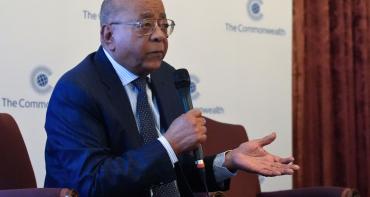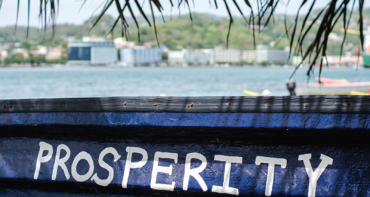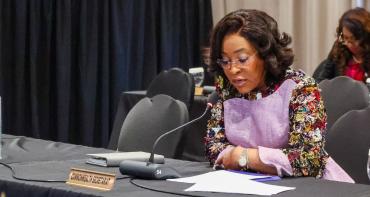
Coolum Declaration – the Commonwealth in the 21st Century: Continuity and Renewal
Coolum, Australia, 2002
At the outset of this new millennium we, the Heads of Government of the Commonwealth of Nations, meeting at Coolum, Australia, renew our enduring commitment to the values and principles which we share. We stand united in:
- our commitment to democracy, the rule of law, good governance, freedom of expression and the protection of human rights;
- our respect for diversity and human dignity; our celebration of the pluralistic nature of our societies and the tolerance it promotes; and our implacable opposition to all forms of discrimination, whether rooted in gender, race, colour, creed or political belief;
- our determination to work to eliminate poverty, to promote people- centred and sustainable development, and thus progressively to remove the wide disparities in living standards among us and overcome the special challenges facing our small state and less developed country members; and
- our collective striving after international peace and security, the rule of international law and the elimination of people-smuggling and the scourge of terrorism.
We reiterate in the strongest terms our condemnation of all forms and manifestations of terrorism. In the aftermath of the events of 11 September 2001 and following our statement of 25 October 2001, we solemnly reaffirm our resolve as a diverse community of nations individually and collectively to take concerted and resolute action to eradicate terrorism. We pledge to work together in fulfilling our international obligations to deny any safe haven for terrorists.
We cannot accept that nearly half the world’s population should live in poverty, nor that disease, illiteracy and environmental degradation should continue to blight the lives of many of our people, nor the fact that in too many societies women continue to face discrimination. The benefits of globalisation must be shared more widely and its focus channelled for the elimination of poverty and human deprivation. We stress the importance of equality of access to economic opportunities and the need to apply new international standards such as the OECD Harmful Tax Initiative evenly, equitably and without exception.
The Fancourt Declaration and the UN Millennium Declaration have laid a firm base for us to push back the frontiers of poverty and under- development. In pursuit of the Millennium Development Goals, we call on governments to seize the opportunities presented by the Financing for Development Conference (Monterrey, Mexico, 18-22 March 2002) and the World Summit on Sustainable Development (Johannesburg, August/ September 2002) to chart a more sustainable and equitable growth path for the world. We also welcome the groundbreaking proposal from Africa to tackle poverty through the New Partnership for Africa’s Development, and will use our best efforts to support similar partnerships in other regions of the Commonwealth. More broadly, we call on all nations to work to reduce the growing gap between rich and poor, and to enhance international support to democracies fighting poverty.
Recognising the links between democracy and good governance on the one hand, and poverty, development and conflict on the other, we call on the Commonwealth Secretary-General to constitute a high-level expert group to recommend ways in which we could carry forward the Fancourt Declaration. This group should focus on how democracies might best be supported in combating poverty, and should report to the next CHOGM.
We are deeply conscious of the threat HIV/AIDS poses to hard-won social and economic progress in much of Africa and elsewhere. As leaders committed to each one of our citizens developing their human potential to the full, we pledge ourselves to combating this pandemic and the spread of other communicable diseases. We urge both the public and private sector, and international organisations, to join with us in a renewed effort to tackle the challenge HIV/AIDS presents to our countries and their people, and to humanity itself.
We recognise the particular vulnerabilities of small states, as well as the need for concerted action by the international community to address their special needs. We further appreciate the importance of systemic changes to respond to these needs, and we commit the Commonwealth to pursue innovative and practical support mechanisms for small states.
Many other challenges confront us daily. As leaders guiding our nations into the 21st century, we need a Commonwealth that both builds on our enduring values and adapts to our evolving needs. We seek a Commonwealth in tune with the future: an organisation which draws on its history, plays to its strengths, vigorously pursues its members’ common interests and seizes the opportunities open to it to shape a better world for our children.
We envisage a modern and vibrant Commonwealth working to serve its peoples, with a simplified structure and a clear focus on what it does best. We want the Commonwealth to be an effective defender of democratic freedoms and a peacemaker in conflict, and to work tirelessly in promoting people-centred economic development.
We have adopted the attached High Level Review Group (HLRG) Report which charts a clear future course for the Commonwealth in line with this vision. The HLRG Report sets out concrete steps to build a Commonwealth for the 21st century:
- we determine materially to strengthen the Commonwealth’s capacity to support its members’ pursuit of democratic values and the rule of law. We have clarified the conditions under which the Commonwealth Ministerial Action Group will in future address serious or persistent violations of the Harare Principles, which go beyond the unconstitutional overthrow of member governments. A clear set of procedures – in which the Secretary-General and the Chairperson-in-Office will have an important part to play – will help ensure transparent and effective dealing with any member state concerned. We are committed to strengthening the Good Offices role of the Commonwealth Secretary-General and have agreed to strengthen the Commonwealth’s work in supporting democratic practice, in resolving tensions, in conflict prevention and resolution, and in post-conflict rebuilding, working in consultation with regional organisations as appropriate.
- in pursuit of a more equitable distribution of the benefits of globalisation and in pursuit of the Millennium Development Goals, we are committed to forging new opportunities for our members in trade, in investment and in private sector development. We have agreed steps which will help our organisation better identify and promote its members’ economic and development needs in an increasingly competitive international environment. We recognise the importance of enhancing market access in the global trading system, particularly for the poorest and smallest countries. To this end, we welcome and give our strong support to the agreement reached in Doha on the World Trade Organisation’s new multilateral trade negotiations. Through an enhanced facilitation role, we want our organisation to help member states get better access to international assistance, and to focus the Commonwealth’s own related programmes more effectively on the assistance it is best-equipped to provide. We support the HLRG’s strategy to bridge the information and communications technology gap between rich and poor.
- recognising that the Commonwealth’s future lies in the hands of its youth, we have agreed to create a pan-Commonwealth ‘Youth for the Future’ initiative composed of four related components for technology and skills transfer, and for fostering youth enterprise. We seek to engage youth, young professionals and youth volunteers more closely, harnessing their skills and enthusiasm to make a major practical contribution to the work of the Commonwealth.
- we seek to rationalise and streamline the Commonwealth’s governance and organisation to provide a simplified structure capable of responding more quickly and effectively to members’ needs.
- we call on the many intergovernmental, professional and civil society bodies which help to implement our Commonwealth values, to join with us in building closer Commonwealth ‘family’ links, and strengthening consultation and collaboration. We are convinced of the need for stronger links and better two-way communication and co-ordination between the official and non-governmental Commonwealth, and among Commonwealth NGOs. This will give Commonwealth activities greater impact, ensuring that every programme produces lasting benefit.
We cherish our shared history and are proud of what we have achieved together over the years. We are convinced that acting on the recommendations of the HLRG Report will better equip the Commonwealth to meet the challenges of the future. Our common values and unique ways of working together provide a special strength in this, which we treasure. We call on our Secretary-General to work assiduously with the Chairman-in-Office, the new governing mechanisms and the wider Commonwealth family to translate the outcomes of the review into a practical reality which benefits all our people.
As we plan for our future, we congratulate Her Majesty Queen Elizabeth II on her completion of fifty years as the Head of the Commonwealth. We are grateful for her dedication in the service of the Commonwealth and her strong commitment to the association for over half a century.
Issued at the Commonwealth Heads of Government Meeting, Coolum, Australia, 2 – 5 March 2002.



